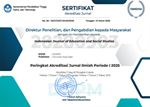Abdah, M. G. (2019). Ragam Pendekatan dalam Pengembangan Kurikulum Pendidikan Agama Islam (PAI). Fondatia, 3(1), 27-41.
Achadah, A. (2020). Model Inovasi Pengembangan Kurikulum PAI untuk Menghadapi Revolusi Industri 4.0. Scaffolding: Jurnal Pendidikan Islam dan Multikulturalisme, 2(1), 1-10.
Adhimiy, S. (2018). Curriculum Developmnent Trought Creative Lesson Plan. Jurnal Cendikia, 16(1), 41–62.
Ahmad. (2021). Konsep Kurikulum Terintegrasi: Analisis Kurikulum Formal dengan Pesantren. Ilmuna, 3(1), 66–84.
Amir. (2021). Curriculum Management In Improving Competitive Advantage in Madrasah. Managere: Indonesian Journal of Educational Management, 3(2), 53–61.
Baharun, H. (2017). Pengembangan Kurikulum; Teori dan Praktik (Konsep, Prinsip, Pendekatan dan Langkah-langkah Pengembangan Kurikulum PAI. Yogyakarta: CV Cantrik Pustaka.
Cahapay, M. B. (2020). A Case Study of Curriculum Unpacking Practices of a Kindergarten Teacher. Journal of Curriculum and Teaching, 9(2), 1–8. https://doi.org/10.5430/jct.v9n2p1
Daeng Pawero, AMV (2018). Critical Analysis of Curriculum Policy Between KBK, KTSP, and K-13. Scientific Journal of Iqra', 12 (1), 42. https://doi.org/10.30984/jii.v12i1.889
Dewantoro, H. (2017). Development of Islamic Religious Education Curriculum in Higher Education. Journal of Islamic Religious Education, 13(2), 223–252.
Dinana, A., & Subiyantoro. (2021). The Role of Caregivers in Management of Changes in the Organizational Environment of The Tegalsari Islamic Boarding School during the Covid-19 Pandemic. Journal of Education, 9(2), 56–66.
Halek, DH (2019). 2013 Curriculum in Philosophical Perspective. Journal of Georafflesia: Scientific Articles of Geography Education, 3(2), 1. https://doi.org/10.32663/georaf.v3i2.567
Hidayat, AW (2020). Policy Review of Islamic Education Curriculum Development Curriculum Model 2013. Al-Murabbi: Journal of Islamic Education and Studies , 6(2), 172–188.
Irsad, M. (2016). Development of Islamic Religious Education Curriculum in Madrasah (Study of Muhaimin's Thought). Iqra', 2(1), 231–267.
Kokkaew, N., Jokkaw, N., Peansupap, V., & Wipulanusat, W. (2022). Impacts of Human Resource Management and Knowledge Management on Non-Financial Organizational Performance: Evidence of Thai Infrastructure Construction Firms. Ain Shams Engineering Journal, 13(6), 101750. https://doi.org/10.1016/j.asej.2022.101750
Li, Q., Huang, S., & Zhu, S. (2020). A Competence-aware Curriculum for Visual Concepts Learning via Question Answering. European Conference on Computer Vision, 3, 141–157.
Lwin, N. N., & Nandar, P. S. (2019). Change Management of Banking Industry. Universities Research Journal, 5(2), 1–10.
Masnan, & Halim, A. (2021). The Concept of Professional Identity: Kindergarten Teachers’ Professionalism Requirement in Malaysian Preschool Curriculum. International Journal of Evaluation and Research in Education, 10(1), 126–134.
Monaziroh, A., & Choirudin, C. (2021). The Development Design of Curriculum 2013 for Fiqih Learning Through a Humanistic Approach. Al-Tanzim: Jurnal Manajemen Pendidikan Islam, 5(1), 140–153.
Nabilah, E., & Basri, H. (2021). Contribution of Hayat School in The Development of Islamic Education Curriculum Era 4.0. Ta'dibuna: Journal of Islamic Education, 10(3), 451–466.
Nasri, N. M., Halim, L., Asyraf, M., & Talib, A. (2020). Self-Directed Learning Curriculum: Students’ Perspectives of University Learning Experiences. Malaysian Journal of Learning and Instruction, 17(2), 227–251.
Nugraha, MT (2016). Development of Islamic Religious Education Curriculum Model (PAI) Towards the Asean Economic Community (MEA). At-Turats, 10(1), 13–21.
Siripipatthanakul, S. (2021). Ethical Change Management: Review Article. Asia eLearning Management Center Working Papers, (August), 1–10.
Suhardi, M., & Mulyono, S. (2021). Changes in The Curriculum of Islamic Educational Institutions in Sambas during The Sambas Sultanate. Ta'dibuna: Journal of Islamic Education, 10(2), 451–466.
Sukirman, D. (2012). Curriculum Development Foundation. FKIP-SWCU Elementary School Teacher Education Study Program, 1, 18–44.
Syafa’ati, S. (2020). Penerapan Kurikulum PHI (Pendidikan Holistik Integral) dalam Pembelajaran di SMPIT LHI Yogyakarta. Islamika, 2(2), 192–207. https://doi.org/10.36088/islamika.v2i2.710
Syndi, M. (2016). Curriculum Dynamics in Indonesia. Modeling: Journal of the PGMI Study Program, 4(2), 192–202.
Taufik, A. (2019). Development of Islamic Education Curriculum. El-Ghiroh, 17(2), 82-102.
Usman, DH, Mujahidin, E. (2021). The Application of The Online Lecture Method in Learning During The Covid-19 Pandemic. Ta'dibuna, 10(4), 496–511. https://doi.org/10.32832/tadibuna.v10i4.5181
Wulandari, I., & Suhardi, E. (2020). Peningkatan Efektivitas Pembelajaran dengan Penguatan Iklim Sekolah dan Pengetahuan Guru tentang Kurikulum 2013. Jurnal Manajemen Pendidikan, 8(1), 7–12. https://doi.org/10.33751/jmp.v8i1.1940
Yuliana, & Subiyantoro. (2017). The Role of Islamic Education Leadership in Management of Environmental Change in Madrasah Ibtidaiyah Educational Organizations An-Nur Ngangkrik Triharjo Sleman. Tadris: Journal of Islamic Education , 12 (2), 146–160.
Yusuf, WF (2018). "Implementation of the 2013 Curriculum (K-13) in Elementary School (SD) Islamic Religious Education Subjects." Journal of Islamic Religious Education , 3 (2), 263–278.
Zhao, R., Chen, X., Chen, Z., & Li, S. (2020). EGDCL: An Adaptive Curriculum Learning Framework for Unbiased Glaucoma Diagnosis. European Conference on Computer Vision, 1, 190–205.
 (Islamic Religious Education Department, Universitas Ahmad Dahlan, Yogyakarta)
(Islamic Religious Education Department, Universitas Ahmad Dahlan, Yogyakarta) 



